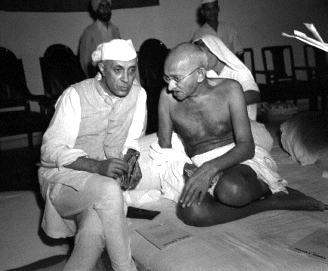Author : Chidanand Rajghatta
Publication : The Indian Express
Date : February 5, 1997
Source :www.hvk.org/articles/0297/0047.html
How the front and rear end service of debauched Nehru to Moutbatten and Edwina shortchanged Pakistan and gave India, Hyderabad, Munabao, Kashmir, UP and East Punjab.

Nehru had gay tendencies, reveals biographer – The Indian Express
The suggestion that Pandit Jawaharlal Nehru had homosexual experiences was made after extensive research and conversations with those who knew him, according to Prof Stanley Wolpert, author of Nehru: A Tryst With Destiny, a new biography which has outraged sections of the Indian intelligentsia.
Speaking to The Indian Express from the University of California in Los Angeles (UCLA) where he teaches Indian history, Prof Wolpert said his conclusions were based on “interviews with a lot of people and my own discussions with Nehru”.
But the controversy, he added, was being blown out of proportion because the references to Nehru’s gay tendencies “constituted only a small section of the book.” The ‘revelation’ though is mentioned on the book jacket.
Prof Wolpert said he did not broach the subject during his three meetings with Nehru in 1957-58, when he spoke with the Indian leader for his doctoral dissertation on the Indian freedom movement. But his own interaction with Nehru during the meetings also helped him to the conclusion, he added.
“My own aim as a scholar is to get as close to the truth as possible… I believe in the Indian motto of Satyameva Jayate…. if I was not convinced enough I would not have written it … those who say 1 have overstated it should counter it with evidence, “the historian said, while himself not proffering any “evidence.”
In the book which has just hit the stands in the United States, and is due for release in India shortly, Wolpert implies that Nehru had several homosexual encounters during his early years in Allahabad, and later at Harrow and Cambridge.
He also describes instances when Nehru dressed in drag “Wearing his wig, made up with lipstick, powder and eye shadow, his body draped in silks and satins, Jawahar most willingly offered himself up night after night to those endless rehearsals for the Gaekwar’s At Home as a beautiful young girl, holding out her jug of wine and loaf seductively to her poet lover, Omar,” he writes in one passage.
The book has received favourable reviews in the American press Publishers Weekly describing it as a “warts-and-all portrait of India’s brilliant and charismatic first prime minister” in which Wolpert “convincingly goes beneath Nehru’s exalted image to reveal some pesky demons.” The New York Times Book Review described the book as being “respectful of its subject but free of the hagiography that has often diminished academic writing on Nehru.”
Neither review touched on Nehru’s supposed homosexual liaisons.
Asked why none of the previous biographies, including the more recent one by M J Akbar, did not allude to this aspect of Nehru’s fife, Wolpert said “I have no idea.”
In the book, Wolpert says Nehru’s first attachment was with a young man called Ferdinand Brooks who was his French teacher. Brooks was a theosophist but Wolpert says before coming to India the “handsome’ man was a disciple and lover of Charles Webster Leadbeater, a renegade Anglican curate who was accused of child molestation and pederasty on several continents. Leadbeater openly advocated mutual masturbation among young boys.
Wolpert also suggests Nehru may have had a gay relationship in Harrow and makes much of Panditji’s admiration for Oscar Wilde



